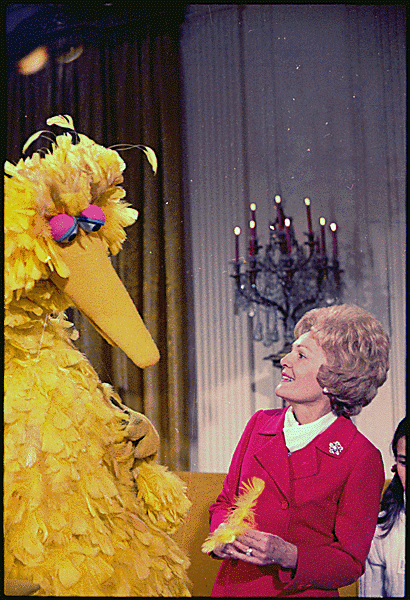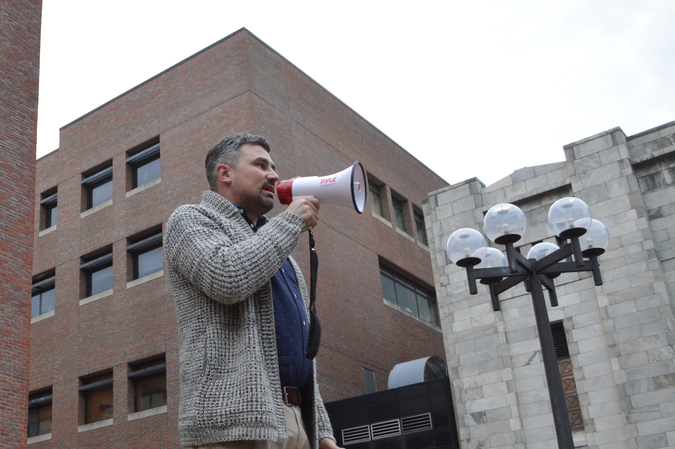Andy Borowitz of the New Yorker recently tweeted, “I worry that all the cheap jokes about Romney wanting to kill Big Bird will make people forget that he wants to kill Planned Parenthood.” It’s true–Big Bird has flooded the mainstream since Governor Mitt Romney’s notorious comment aired at the first presidential debate. The Sesame Street character has appeared on SNL’s Weekend Update and now touts a handful of novelty Twitter accounts. But concerns about Planned Parenthood aside, Big Bird is only a lamentable metonym for those who will be affected by Romney’s proposed cuts.

Romney’s website addresses his proposed budget cuts accordingly:
“The Federal Government Should Stop Doing Things The American People Can’t Afford, For Instance: […]
Reduce Subsidies For The National Endowments For The Arts And Humanities, The Corporation For Public Broadcasting, And The Legal Services Corporation — Savings: $600 Million. NEA, NEH, and CPB provide grants to supplement other sources of funding. LSC funds services mostly duplicative of those already offered by states, localities, bar associations and private organizations.”
Is “reduce” a euphemism for extricate? According to the CPB, Massachusetts received $21,630,070 in grants from the organization that supports radio and television programs such as WBUR-FM and WGBH. WBUR alone received $1,308,842 in 2011, a decrease from 2010. Charlie Kravetz, general manager of WBUR said, “The CPB grant is adjusted every year based upon a formula. This decrease wasn’t unexpected.” While WBUR is capable of maneuvering fund fluctuations, Kravetz added that WBUR receives six percent of its funding from this grant and depends upon it greatly.
These subsidies originally were created thanks to the Public Broadcasting Act of 1967 under President Lyndon B. Johnson. The bill passed with a majority of 266-91, not only to “enrich man’s spirit,” as President Johnson declared at its signing, but also to prioritize non-profit educational programming. Subsequent broadcasting stations would serve public interest and protect against skewed journalism.
Romney’s attack on public broadcasting is not the first such instance. In 2011, House Republicans initiated a request for cuts to CPB funding at the same time as NPR was dealing with its anti-Tea Party fundraiser controversy and the firing of political analyst Juan Williams. The NPR fundraiser in question not only bashed the political party but also claimed better efficiency without government support; Williams, who also worked for Fox News, was fired after comments made about his anxiety regarding Muslims at airports.
Is Romney’s plan a counterattack on NPR’s recent leftist bent? The combination of these two NPR controversies appears like an extradition of the political right. However, the 1967 bill prescribed that these broadcast organizations should “constitute an expression of diversity and excellence, [and] constitute a source of alternative telecommunications services for all the citizens of the Nation.” While these proposed budget cuts may be a response to lackluster performance, it is clear that America’s priorities have changed profoundly over the course of forty-five years.
Across the pond, impartial broadcasting is spearheaded by the British Broadcasting Corporation, which likewise is funded by tax-paying Britons. The BBC’s annual report for 2011-2012 claims that “the public continued to see the BBC as the leading source of accurate and impartial news, which continued to attract record audiences. More than 80 per cent of U.K. adults each week consumed the BBC’s coverage of stories such as the summer riots, Arab Spring and Japanese earthquake and tsunami.” The corporation’s audience appreciation index also “rose above 80 for the first time ever.”
James Mercer, a marketing director at Yum! Restaurants International in the United Kingdom, supports the BBC’s claims: “[it’s] my first choice for online news, it’s in my favorites list of websites and [I] spend time on it pretty much every day. I don’t look at any other news sites.”
When asked about his tax commitment to the BBC, he’s “OK with the TV license as there are no ads.” Although Mercer is a marketer who creates on average 25 ads for TV per year, news sans advertisements remains a priority. He adds that “the quality of the programming is excellent and the breadth and depth of news is fantastic.” At the same time, he would not respond well to tax increases for this public service.
Mercer repeatedly called the BBC the “Beeb” and suggested that admiration for the BBC extends from general U.K. affection for national institutions, which include its monarchy and National Health Service. It’s not only a point of national pride that the BBC provides programming that is commercial-free and comparable to cable services, but also that it’s obviously seen as a worthy investment of public, if not global, interest.
NPR makes similar claims by comparison in its 2010 annual report that it “held firm to the journalistic standards and excellence that have been hallmarks of the organization since our founding.” But is NPR a point of national pride?
The CPB declares its own importance since “funding for [it] helps to support more than 21,000 American jobs, which contribute more than $1 billion to the national economy.”
When asked further about WBUR’s six-percent in aid, Kravetz stated that “[it] is a substantial amount of money. The loss of which would be dearly felt.” While Saturday Night Live’s parody of NPR, Delicious Dish, spiritedly satirizes the concept of public broadcasting, the U.S. does not have an affectionate nickname for the organization on par with Mercer’s BBC tag.
This absence of a nickname, however, does not reflect upon the popularity of NPR and corresponding local stations. Kravetz is “hopeful that the people of Boston would step up and help make up for such a loss in the first year at least” if these cut-backs occur. The national level of support is not nearly as important as local advocation and aid.



